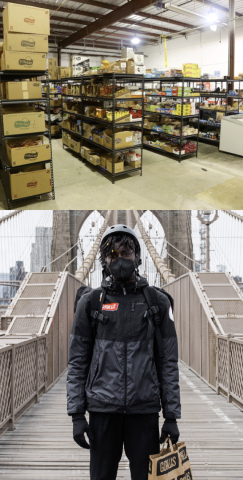Q-commerce is a sub-category of the Delivery sector. See all definitions of FoodTech and its categories here.
The “Q-commerce” FoodTech category regroups startups operating dark stores (a small warehouse that is used exclusively for online deliveries) to bring groceries to consumers almost instantly.
In a word, quick-commerce is about delivering grocery items in less than 10 or 15 minutes (in Europe, that is; in the US, it is more like 30 minutes). Companies operate their own small warehouses (dark stores) inside city centres and employ the people who deliver the groceries (in opposition to the gig-economy workers of restaurant delivery platforms).
Quick-commerce startups have really emerged during the pandemic and in its aftermath. However, the concept is not that new. Leaders in that space have been active for some time. GoPuff, the US leader, was founded in 2013. However, it raised the majority of the staggering $3.4B it has received in funding in the 12 months after the first wave of Covid.
Players in this space are showing incredible operational capabilities. They open in new countries and new cities at an incredible speed. Many boost their ability to grow fast in order to attract new money from investors. Startups have been acquired only a few months after having started their operations (notably Dija which had raised $20M before launching and was acquired by GoPuff in 6 months) while others are already rumoured to be out of cash and close to stopping their operations.

In the longer term, these startups will face a set of existential questions that may break them or at least help them to differentiate:
- Today, quick-commerce companies are leaner than traditional (or even new) retailers as they don’t operate large warehouses and count on foodservice or retail partners to deliver the items to their stores. However, as they look to improve their margins by negotiating directly with brands, they may need to create their own logistics.
- A key component of their business model could be to deliver more marketing data and insights to brands (as for restaurant delivery startups). This reopens the question of being large enough to provide relevant data and independent enough from traditional retailers.
- Another path could be to move toward private labels as some companies are already doing. This requires a very strong brand and may alienate the relationship with big brands and hence the aforementioned business model extensions.
Key startups to consider
DigitalFoodLab’s additional insights
- 26/11/2021 – Food delivery: Going transatlantic
- 30/09/2021 – Grocery Delivery – 2 billions in 2 weeks
- 23/09/2021 – What is the future of quick-commerce?
- 22/06/2021 – Go big or go home
- 04/05/2021 – €1.8B invested in European grocery delivery startups in less than 4 months
- 06/04/2021 – When startups raise billions (GoPuff, Deliveroo)
- 11/03/2021 – Money is raining over grocery delivery startups
- 12/02/2021 – FoodTech Zapping : Tiller gets acquired, new dark stores and dark kitchens in France
Get in Touch
We work with our clients to identify and act on the best Foodtech opportunities
By email
contact@digitalfoodlab.com
Our office
14 avenue de L’Opéra, 75001 Paris, France

